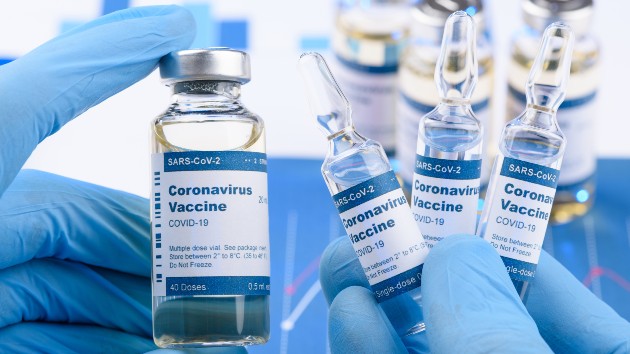
nevodka/iStock
nevodka/iStockBy DR. ADJOA SMALLS-MANTEY, ABC News
(NEW YORK) — The Centers for Disease Control and Prevention recommended the Johnson & Johnson one-shot COVID-19 vaccine for use in people 18 years of age and older Sunday — the last regulatory step needed before a third COVID-19 vaccine could be made available to the public.
In an emergency meeting, the CDC’s Advisory Committee on Immunization Practices (ACIP) reviewed the vaccine trial data and voted to recommend the vaccine. The vote was later formalized by CDC Director Dr. Rochelle P. Walensky.
In a press release, Walensky said the new vaccine would offer “more options and flexibility for the public, jurisdictions and vaccine providers.”
The CDC did not weigh in on whether it would recommend certain people get the one-shot vaccine over existing two-shot vaccines from Pfizer and Moderna, instead emphasizing the importance of getting vaccinated with any available option.
“Getting vaccinated with the first vaccine available to you will help protect all of us from COVID-19,” Walensky said.
With a new vaccine added to the nation’s arsenal, here’s what you should know about the Johnson & Johnson COVID-19 vaccine:
How the Johnson & Johnson vaccine works
The Johnson & Johnson vaccine is a viral vector vaccine. It is made from an inactivated adenovirus, the virus that causes the common cold, and contains a piece of DNA that instructs the body to make the COVID-19 spike protein.
This in turn triggers an immune system response, giving you protection should you ever be exposed to the real virus in the future.
The use of genetic instructions makes the Johnson & Johnson vaccine similar — but not exactly the same — to the Pfizer-BioNTech and Moderna vaccines, which contain mRNA that instructs the body to make the COVID-19 spike protein.
You cannot get COVID-19 or a cold from any of the authorized vaccines, because they do not contain live virus.
How well the Johnson & Johnson vaccine works
In clinical trials, the Johnson & Johnson vaccine was 85% effective in preventing severe/critical illness and 66% effective in preventing symptomatic illness 28 days after vaccination. Importantly, it was 100% effective in preventing hospitalization and death from COVID-19.
The Pfizer-BioNTech and Moderna vaccines are 95% and 94.1% effective in preventing symptomatic illness, respectively, but they were tested before the new, more contagious variants emerged. The Johnson & Johnson vaccine was tested against the new concerning variants and still performed well.
In fact, experts caution against comparing the relative effectiveness of vaccines because of differences in the way they were tested.
The “[Johnson & Johnson] vaccine was not compared to the Pfizer or Moderna vaccine, which in fact, were not compared to each other,” said Dr. Lorry Rubin, director of pediatric infectious diseases at Northwell Health’s Cohen Children’s Medical Center and a former ACIP member. “These studies were done at a somewhat different time period, and we have different variants of the COVID-19 virus circulating, so it’s not really comparing apples to apples.”
The FDA’s standard for authorization and approval of any COVID-19 vaccine is at least 50% efficacy in preventing symptomatic disease, meaning the Johnson & Johnson vaccine far exceeds this threshold.
The flu vaccine, on average, is “about 50% effective” across all age groups, according to Rubin.
“So, some people might say that’s a failure, but you are saving tens of thousands of lives each year,” he said.
How safe the vaccine is
The most common side effects reported in the Johnson & Johnson clinical trials were the side effects that typically occur with any vaccine, including pain at the injection site, fever and fatigue, which typically lasts 24 to 48 hours.
“From the data available in the application to the FDA for the emergency use authorization, the vaccine looks to be safe,” Rubin said. “We have to differentiate the annoying post-vaccine sore arms, fever, and muscle aches from the definition of SAEs, severe adverse events.”
No severe adverse reactions were reported during the trial, but the company is investigating two possible cases of anaphylaxis that were later reported.
How dosing and storage works
The Johnson & Johnson vaccine is one dose and can be stored at normal refrigerator temperatures. The Moderna and Pfizer-BioNTech vaccines are two doses and require more stringent temperature regulation.
Walensky called the new vaccine another “important tool in our toolbox.”
“As a one-dose vaccine, people do not have to return for a second dose to be protected,” Walensky said, according to prepared remarks. “In addition, this vaccine does not need to be kept in a freezer and can be stored at refrigerated temperatures — so it is easy to transport and store and allows for expanded availability in most community settings and mobile sites, as supply scales up.”
Why the best vaccine to get is any one you can get
The Johnson & Johnson vaccine is safe and highly efficacious, similar to the other COVID-19 vaccines that have already been authorized. Members of the public might not have a choice of which vaccine they get, because it depends on the distribution site. The most important thing, experts stress, is that people get any of the COVID-19 vaccines when it becomes available to them.
“COVID-19 is a potentially fatal disease, and it sometimes even causes death in previously healthy 20- and 30-year-olds,” Rubin said.
“All the vaccines protect against serious and fatal disease, and they protect to a large extent from getting sick at all from the infection,” Rubin said. “It’s a time thing. Get whichever one you can get first.”
Copyright © 2021, ABC Audio. All rights reserved.